THE GOSPEL
ACCORDING TO
MARK
JAMES R. EDWARDS
T HE GENERAL ACCEPTANCE OF Markan priority in the nineteenth century directed unprecedented attention on the Gospel of Mark from both academy and church. No longer was the second Gospel viewed as an inferior abridgment of Matthew; rather, its author was seen as the first to write the story of Jesus in the form of a Gospel, which became the primary influence on the subsequent Gospels of Matthew and Luke.
Scholarship on the Gospel of Mark today shows no sign of abating. Yet commentaries on Mark have not kept pace with the wealth of scholarly studies, articles, and monographs. This work by James R. Edwards is a welcome addition in filling this gap. Edwards has devoted three decades to the study of Mark and has endeavored to locate the second Gospel fully within the historical and social conditions of first-century Palestine as they are known through extrabiblical literature, inscriptions, and archaeology. Features unique to this commentary include clear discussions of terms like scribe, tax collector, Sanhedrin, and levirate marriage terms that, though familiar to many readers of the Bible, are often inadequately understood. Additionally, Edwards explores the Gospels literary features, including Marks use of the sandwich technique as well as of imagistic motifs and irony. Edwards proposes a new paradigm for interpreting the difficult Little Apocalypse of chapter 13, and he argues for a new understanding of Marks controversial ending.
These are only the starting points of the commentary, however. The Gospel of Mark was a product of the earliest Christian community, and it remains a document whose primary message is for the church, even today. The central aim of Edwardss work is to interpret the Gospel of Mark according to its theological intentions and purposes, especially as they relate to the life and ministry of Jesus and the call to faith and discipleship.
James Edwardss new, careful study of the earliest Gospel brings together his interest in and ongoing research regarding Marks work. He does so in a way that will have a broad appeal to a wide audience, including the academic community and pastors and teachers. This is an excellent piece of applied research and rigorous study
RALPH P. MARTIN
Fuller Theological Seminary
JAMES R. EDWARDS is professor of religion at Whitworth College, Spokane, Washington. He has written numerous articles in scholarly and popular journals and is a contributing editor of Christianity Today. His other books include The Laymans Overview of the Bible, The Divine Intruder: When God Breaks into Your Life, and the volume on Romans in the New International Biblical Commentary series.
PNTC volumes now available:
| MATTHEW | EPHESIANS |
| Leon Morris | Peter T. OBrien |
| MARK | JAMES |
| James R. Edwards | Douglas J. Moo |
| JOHN | LETTERS OF JOHN |
| D. A. Carson | Colin G. Kruse |
| ROMANS |
| Leon Morris |
T HE P ILLAR N EW T ESTAMENT C OMMENTARY
General Editor
D. A. CARSON
The Gospel
according to
MARK
JAMES R. EDWARDS
W ILLIAM B. E ERDMANS P UBLISHING C OMPANY
G RAND R APIDS , M ICHIGAN / C AMBRIDGE , U.K.
 APOLLOS
APOLLOS
LEICESTER, ENGLAND
2002 Wm. B. Eerdmans Publishing Co.
255 Jefferson Ave. S.E., Grand Rapids, Michigan 49503 /
P.O. Box 163, Cambridge CB3 9PU U.K.
All rights reserved
www.eerdmans.com
First published 2002 in the United States of America by
Wm. B. Eerdmans Publishing Co.
and in the United Kingdom by
APOLLOS
38 De Montfort Street, Leicester, England LE1 7GP
Library of Congress Cataloging-in-Publication Data
Edwards, James R.
The Gospel according to Mark / James R. Edwards.
P. cm. (The Pillar New Testament commentary)
Includes bibliographical references and index.
ISBN 0-8028-3734-4 (cloth: alk. paper)
1. Bible. N.T. Mark Commentaries.
I. Title. II. Series.
BS2585.3.E39 2002
226.307 dc21
2001040535
British Library Cataloguing in Publication Data
A catalogue record for this book is available from the British Library.
ISBN 0-85111-778-3
Scripture taken from the HOLY BIBLE: NEW INTERNATIONAL VERSION. NIV. Copyright 1973, 1978, 1984 by International Bible Society. Used by permission of Zondervan Publishing House.
To my mother,
Mary Eleanor Callison Edwards,
who, in accordance with Hebrews 13:7,
first spoke to me the word of God,
and whose life has been an inspiration to my faith.
Contents
Series Preface
Commentaries have specific aims, and this series is no exception. Designed for pastors and teachers of the Bible, the Pillar commentaries seek above all to make clear the text of Scripture as we have it. The scholars writing these volumes interact with the most important informed contemporary debate, but avoid getting mired in undue technical detail. Their ideal is a blend of rigorous exegesis and exposition, with an eye alert both to biblical theology and the contemporary relevance of the Bible, without confusing the commentary and the sermon.
The rationale for this approach is that the vision of objective scholarship (a vain chimera) may actually be profane. God stands over against us; we do not stand in judgment of him. When God speaks to us through his Word, those who profess to know him must respond in an appropriate way, and that is certainly different from a stance in which the scholar projects an image of autonomous distance. Yet this is no surreptitious appeal for uncontrolled subjectivity. The writers of this series aim for an evenhanded openness to the text that is the best kind of objectivity of all.
If the text is Gods Word, it is appropriate that we respond with reverence, a certain fear, a holy joy, a questing obedience. These values should be reflected in the way Christians write. With these values in place, the Pillar commentaries will be warmly welcomed not only by pastors, teachers, and students, but by general readers as well.
* * * * *
Good commentaries on the canonical Gospels are particularly difficult to write. The demands are considerable: fine historical sense and theological maturity; working with diverse literary genres; a thorough grasp of both Jewish and Greco-Roman backgrounds; a command of the vast secondary literature without letting that literature dictate the agenda or swamp the reader with endless peripheral details. James Edwards meets these challenges admirably. His commentary reflects a lifetime of study, a quality of judgment that is knowledgeable and sure-footed. To all this he adds a quiet reverence for the text that is both appropriate and edifying. It is a pleasure and an honor to include his commentary in the series.
D. A. C ARSON
Authors Preface
The present volume represents a Lieblingsarbeit in my scholarly life a work dear to my heart. This is true not only because of the subject itself but also because of the people to whom it has introduced me. I was first introduced to the academic study of Mark thirty years ago in Professor Eduard Schweizers New Testament Seminar in Zrich, Switzerland. Schweizers commentary on Mark had a profound influence on me, and the conversations I enjoyed with Eduard, especially in my frequent visits to his home, remain among the rich memories of my life. When I embarked on Ph.D. studies at Fuller Seminary in the mid-1970s I was fortunate to be able to pursue my studies under another leading Mark scholar, Professor Ralph Martin, whose mastery of both the breadth and details of New Testament scholarship guided me in the completion of my dissertation on the Son of God in the Gospel of Mark. My indebtedness to both these Christian scholars is large and lasting.
Next page


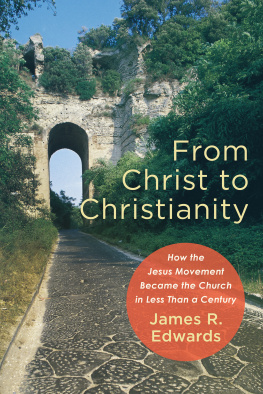
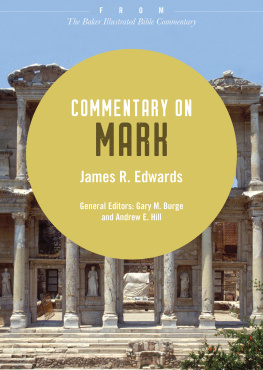
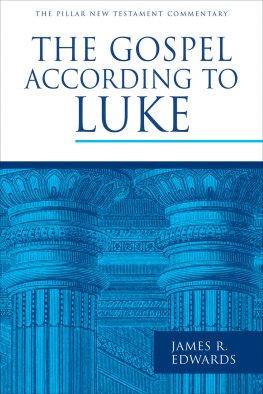
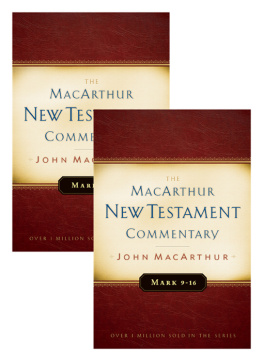
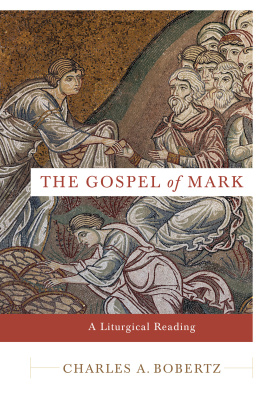
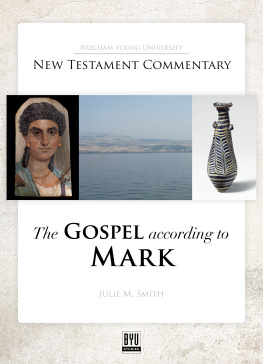
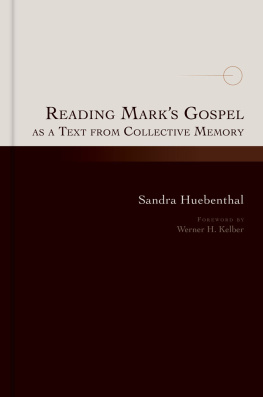

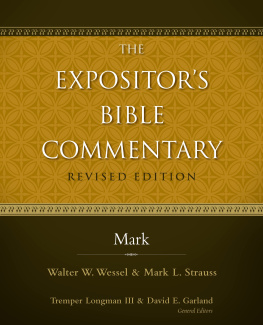
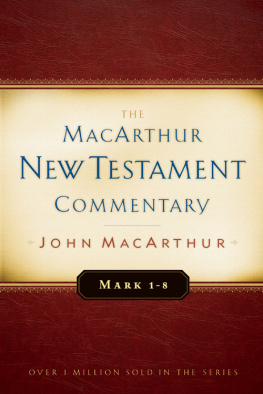
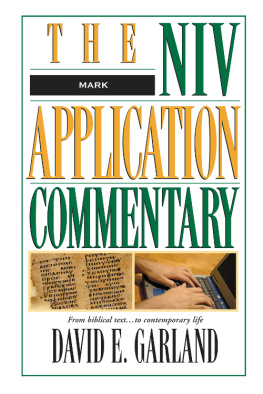
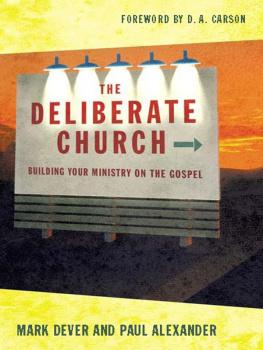
 APOLLOS
APOLLOS